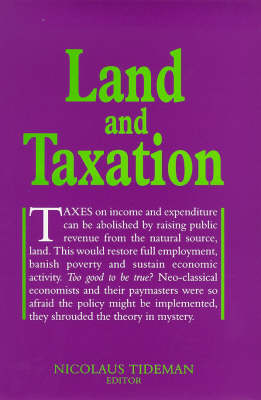
Land and Taxation
Seiten
1994
Shepheard-Walwyn (Publishers) Ltd (Verlag)
978-0-85683-162-1 (ISBN)
Shepheard-Walwyn (Publishers) Ltd (Verlag)
978-0-85683-162-1 (ISBN)
A century ago, neo-classical economists obscured the distinctive qualities of land as the natural source of public revenue. This theoretical revisionism had the effect of confusing governments. To achieve clarity in policy-making, it is necessary to distinguish the unique qualities of land as a factor of production.
This work argues that economists know the secret of prosperity: that the optimum conditions for private enterprise are achieved when taxes on the earned incomes of labour and capital are abolished. This complements the fairest and most efficient way to finance the public sector out of unearned income from land. This policy, as Professor Nicolaus Tideman explains, has been developed and endorsed by economists in a theoretical tradition that stretches from some of today's Nobel prize-winners back to Adam Smith. Why, then, have governments ignored the policy? A century ago, neo-classical economists obscured the distinctive qualities of land as the natural source of public revenue. This theoretical revisionism had the effect of confusing governments, as Vic Blundell explains in his review of British land taxation. To achieve clarity in policy-making, it is necessary to distinguish the unique qualities of land as a factor of production. Professor Mason Gaffney offers a complete analysis of land that should now enable economists to revise their theories, so that they make sense in the real world.
The problem-solving qualities of the new economic paradigm are illustrated by Dr Fred Foldvary. One of the urgent challenges confronting governments is the need to reduce benefit claims on the public purse. Reform of the structure of public finance would restore full employment and raise wages above poverty levels without inflation, making it possible to reduce the overall tax burden. The book is part of "The Georgist Paradigm" series, which looks afresh at the issues economists have tried unsuccessfully to solve. It draws its inspirations from the work of the 19th-century American social reformer Henry George, whose critique of the capitalist system vied with the communist critique for the support of reformers the world over until the end of World War I.
This work argues that economists know the secret of prosperity: that the optimum conditions for private enterprise are achieved when taxes on the earned incomes of labour and capital are abolished. This complements the fairest and most efficient way to finance the public sector out of unearned income from land. This policy, as Professor Nicolaus Tideman explains, has been developed and endorsed by economists in a theoretical tradition that stretches from some of today's Nobel prize-winners back to Adam Smith. Why, then, have governments ignored the policy? A century ago, neo-classical economists obscured the distinctive qualities of land as the natural source of public revenue. This theoretical revisionism had the effect of confusing governments, as Vic Blundell explains in his review of British land taxation. To achieve clarity in policy-making, it is necessary to distinguish the unique qualities of land as a factor of production. Professor Mason Gaffney offers a complete analysis of land that should now enable economists to revise their theories, so that they make sense in the real world.
The problem-solving qualities of the new economic paradigm are illustrated by Dr Fred Foldvary. One of the urgent challenges confronting governments is the need to reduce benefit claims on the public purse. Reform of the structure of public finance would restore full employment and raise wages above poverty levels without inflation, making it possible to reduce the overall tax burden. The book is part of "The Georgist Paradigm" series, which looks afresh at the issues economists have tried unsuccessfully to solve. It draws its inspirations from the work of the 19th-century American social reformer Henry George, whose critique of the capitalist system vied with the communist critique for the support of reformers the world over until the end of World War I.
A former economist at the U.S. President's Council of Economics Advisers
| Erscheint lt. Verlag | 1.1.1999 |
|---|---|
| Reihe/Serie | Georgist Paradigm S. |
| Verlagsort | London |
| Sprache | englisch |
| Maße | 145 x 229 mm |
| Themenwelt | Recht / Steuern ► EU / Internationales Recht |
| Recht / Steuern ► Steuern / Steuerrecht | |
| Wirtschaft ► Betriebswirtschaft / Management ► Rechnungswesen / Bilanzen | |
| Betriebswirtschaft / Management ► Spezielle Betriebswirtschaftslehre ► Immobilienwirtschaft | |
| Wirtschaft ► Volkswirtschaftslehre ► Wirtschaftspolitik | |
| ISBN-10 | 0-85683-162-X / 085683162X |
| ISBN-13 | 978-0-85683-162-1 / 9780856831621 |
| Zustand | Neuware |
| Haben Sie eine Frage zum Produkt? |
Mehr entdecken
aus dem Bereich
aus dem Bereich
Handbuch für Studium und Praxis
Buch | Hardcover (2023)
Vahlen (Verlag)
79,00 €
Erfolgsstrategien für den modernen Immobilienmarkt
Buch | Softcover (2024)
ForwardVerlag
18,00 €
warum Rene Benkos Immobilienimperium zusammenbrach und was dem …
Buch | Hardcover (2024)
FinanzBuch Verlag
22,00 €


